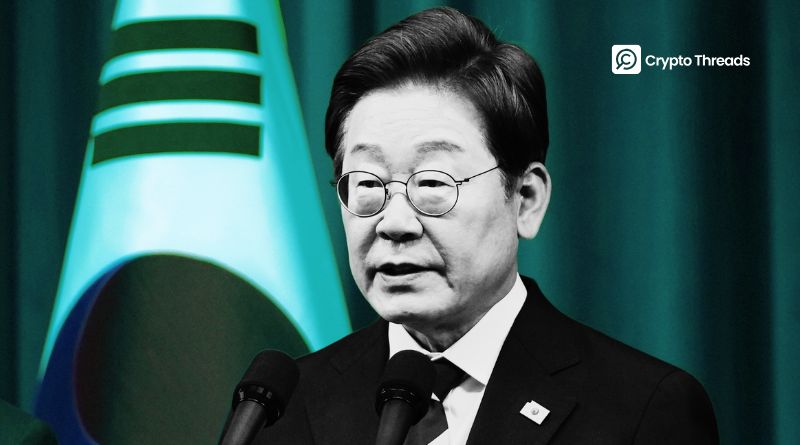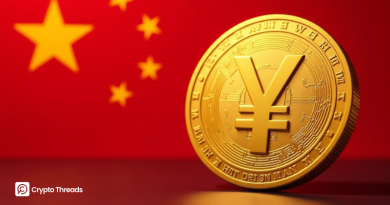Lee Jae-myung’s Crypto Promise: South Korea’s New Era Begins Amid Legal Storms
South Korea has entered a new chapter with the inauguration of President Lee Jae-myung on June 4, 2025, marking the rise of one of the world’s most crypto-friendly leaders. Despite facing multiple legal challenges, the former factory worker turned president brings ambitious plans to transform the nation’s digital asset landscape.
Lee Jae-myung inauguration ceremony
From Rags to Presidential Palace: A Crypto Champion Emerges
Lee Jae-myung’s remarkable journey from a teenage factory worker to South Korea’s highest office represents more than just personal triumph. His presidency signals a fundamental shift toward cryptocurrency adoption in one of Asia’s largest digital asset markets.
The 62-year-old leader campaigned extensively on crypto promises, targeting the nation’s 15 million cryptocurrency investors. His victory comes at a crucial time when South Korea seeks to establish itself as a global cryptocurrency hub while managing the aftermath of political upheaval following Yoon Suk Yeol’s impeachment.
South Korea crypto trading volumes surge
Bold Crypto Initiatives on the Horizon
Digital Asset Basic Act (DABA) Acceleration
President Lee’s administration is expected to fast-track the Digital Asset Basic Act, which has been in development under the previous administration. The Democratic Party’s newly formed Digital Asset Committee, led by lawmaker Min Byoung-dug, aims to pass DABA through the National Assembly this year.
The legislation proposes:
- Legally recognized self-regulatory bodies
- Comprehensive stablecoin approval system
- Clearer compliance rules for crypto service providers
- Enhanced investor protection mechanisms
Spot Crypto ETF Legalization
One of Lee’s flagship campaign promises involves approving spot cryptocurrency exchange-traded funds (ETFs), currently banned under existing law. This move would align South Korea with global markets and provide institutional investors with regulated crypto exposure.
The Financial Services Commission has already initiated discussions on crypto ETFs, with industry experts calling for Bitcoin and Ethereum ETFs to boost market legitimacy.
Pro-crypto president promises ETF approval
Won-Based Stablecoin Development
Perhaps the most ambitious proposal involves launching a Korean won-backed stablecoin. This initiative aims to:
- Reduce capital outflows from domestic markets
- Leverage K-culture influence in Southeast Asia
- Create a centralized, fiat-backed alternative to algorithmic stablecoins
- Strengthen Korea’s position in global digital payments
This proposal notably contrasts with the failed Terra project, emphasizing regulatory compliance and traditional banking backing rather than algorithmic mechanisms.
National Pension Service Crypto Investment
Lee has proposed allowing the National Pension Service, one of the world’s largest pension funds, to invest in digital assets. This institutional adoption could inject significant capital into the cryptocurrency market while providing diversification for retirement funds.
Legal Challenges Cast Shadows
Despite his crypto-friendly agenda, President Lee begins his term under unprecedented circumstances – becoming the first South Korean president to take office while facing active criminal charges.
Five Major Legal Cases
- Election Law Violation: Supreme Court remanded case for false campaign statements, with retrial scheduled for June 18, 2025
- Corruption Charges: Allegations of collusion with private developers during his tenure as Seongnam City mayor
- Public Fund Misuse: Accusations of using government funds for personal expenses as Gyeonggi Province governor
- Illegal North Korea Transfers: Charges related to unauthorized money transfers to North Korea in 2018
- Perjury Subornation: Appeals case for allegedly inducing false witness testimony
President faces multiple court proceedings
Constitutional Immunity Questions
A critical legal question surrounds Article 84 of the Constitution, which grants presidential immunity from criminal prosecution. Legal experts remain divided on whether this immunity applies to pre-existing cases, creating unprecedented judicial territory.
Market Impact and Industry Response
The cryptocurrency industry has welcomed Lee’s victory with cautious optimism. South Korea’s crypto market, valued at over $50 billion in daily trading volume, represents approximately 15% of global cryptocurrency activity.
Key market implications include:
- Potential regulatory clarity reducing compliance costs
- Increased institutional participation through ETFs and pension investments
- Enhanced market stability through proper stablecoin frameworks
- Reduced monopolistic practices in domestic exchanges
North Korea Crypto Threats Remain
President Lee’s diplomatic approach toward North Korea contrasts sharply with his predecessor’s hardline stance. However, Pyongyang’s state-sponsored cryptocurrency hacking operations continue posing significant security challenges.
North Korean hackers reportedly stole $1.4 billion in cryptocurrency during 2024, with proceeds allegedly funding weapons programs. Lee’s administration must balance diplomatic overtures with cybersecurity protection for South Korea’s thriving crypto ecosystem.
North Korean crypto theft trends
Global Implications and Competition
South Korea’s crypto-friendly pivot occurs amid increasing global competition for digital asset leadership. The country joins Singapore, Switzerland, and other nations in creating favorable regulatory environments to attract cryptocurrency businesses and investments.
Lee’s policies could position South Korea as:
- A regional cryptocurrency trading hub
- A leader in regulated stablecoin development
- A bridge between traditional finance and digital assets
- A competitive alternative to Hong Kong and Singapore
Looking Ahead: Implementation Challenges
While Lee’s crypto promises generate excitement, implementation faces several hurdles:
- Legislative approval for major policy changes
- Regulatory coordination between multiple government agencies
- International compliance with global anti-money laundering standards
- Market stability during transition periods
- Legal resolution of the president’s ongoing court cases
The next few months will prove crucial as Lee’s administration navigates between ambitious crypto reforms and complex legal challenges.
Conclusion: A New Chapter for Korean Crypto
President Lee Jae-myung’s inauguration marks a watershed moment for South Korea’s cryptocurrency industry. His comprehensive crypto agenda – from ETF approval to stablecoin development – signals serious commitment to digital asset integration.
However, the success of these initiatives depends heavily on resolving legal uncertainties and maintaining political stability. As Lee faces his first court hearing on June 18, the crypto community watches closely to see whether his ambitious vision can overcome personal and political obstacles.
For South Korea’s 15 million crypto investors, Lee’s presidency represents hope for greater regulatory clarity and institutional acceptance. The coming months will determine whether this former factory worker can deliver on his promises to transform one of the world’s most active cryptocurrency markets.
The stakes extend beyond South Korea’s borders, as success could inspire similar crypto-friendly policies across Asia, while failure might reinforce skepticism about political leaders’ cryptocurrency commitments.



